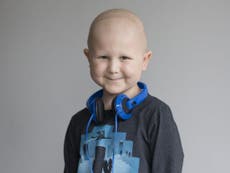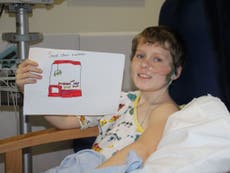How six-year-old James McCartney came home for Christmas after a year at Great Ormond Street Hospital
'Now he’s home, it’s wonderful – we’ve realised how much normal family stuff we have missed in the last year'
James McCartney’s sister Ellie, 12, found out that her younger brother was coming home from Great Ormond Street Hospital (GOSH) just as she was about to step on stage to perform at her local dance school.
For James’s mother, Emma, delivering the news earlier this month was an “emotional moment” as in previous years James has taken part in the same dance show near the family home in Ashtead in Surrey.
At the start of this year, though, he was taken to GOSH, where Emma and his father, Tony, discovered the six-year-old was suffering from haemophagocytic lymphohistiocytosis, an extremely rare and life-threatening condition that was causing his immune system to attack his tissues and organs. He was close to death several times and his only hope was a risky bone-marrow transplant, which doctors carried out just over three months ago.
“James was in the same show last year, so it was emotional to watch. It seemed fitting that was the day we discovered he could come home,” said Emma, who was preparing for a “quiet family Christmas” when we spoke, with her husband, their two daughters and James.
The Independent on Sunday’s Give to GOSH appeal has been following James and his successful treatment over the past several months as part of an appeal that will help support GOSH’s paediatric research and treatment. it will also help support the Louis Dundas Centre for Children’s Palliative Care, the hospital’s world-class centre dedicated to research, teaching and care for children with life-limiting illnesses.
“Now he’s home, it’s wonderful. We’ve realised how much normal family stuff we have missed in the last year,” said Emma. “It’s amazing to have family meals again and read him a bedside story from his own bookshelf. It’s the small things that matter now.”
Now James has been home a week, his family are taking stock as they “readjust to normality” and come to terms with their “emotional trauma”. His sisters, Ellie and Caitlin, have also faced tough times, responding with a strength and maturity that belies their youth. “We missed James, and Mum and Dad were with him all the time, but we weren’t jealous. We have both had to be more mature and we are really proud of James,” said Ellie, who along with her older sister has raised hundreds of pounds for GOSH and is running a pampering day with a raffle and makeovers next month to raise even more.
James spent nearly all of this year in hospital, with his parents taking turns to be by his bedside in London, so much of the housework fell to older sister, Caitlin, 15. She was supported by a string of family friends and grandparents, who came to stay with the girls. They took turns travelling up to GOSH to see James and catch up with their mum and dad. “When he was in intensive care, that was really difficult going in and seeing the state he was in, but even then he was positive, you could tell. I think it’s better he’s young because he had a lot less questions and got on with it,” said Caitlin.
Both girls speak intelligently and emotionally about their brother, and their parent’s pride in them is obvious to all. Last month, James’s doctor told The IoS that the support James got from his family was vital. “We couldn’t be prouder of Ellie and Caitlin… even if James has just thrown a jigsaw at Caitlin,” said Tony, as he turned to deal with his children, delighted to hear them misbehaving.
“It’s nice to see them being normal again, fighting like brother and sister. It could drive you mad but it’s exactly what we were praying for six months ago.”
In his mind there is “no doubt” that James’s recovery has been “significantly” aided by his sisters, and Tony puts his family’s resilience down in part to the support they received at GOSH. Throughout James’s stay the five of them were offered by support by the clinical psychology team, including Dr Kirsty Abbas, who said the impact of a long stay can have a “huge impact on all family members” and creates long-term “emotional stresses”.
For his part, James came home last week and his doctors are optimistic. Dr Paul Veys, the director of the Bone Marrow Transplant Unit at GOSH, who leads the team treating James, said he is now “clinically stable” but that “more time is required” before his doctors can say if that will be “maintained long-term”. James is now in infection control: he won’t be able to go back to school for some time and can’t have many visitors, as his parents anxiously wait to see if his bone marrow transplant has been totally successful.
“He was on his bike this morning for the first time since he came home. It’s wonderful to see, and there’s all the pride and admiration for him there,” said Tony. “One of things we’ve found, though, is that we have to relearn how to enjoy being at home and relaxing, and not automatically to think something is wrong if James is quiet for five minutes.”
His parents are both hopeful and his condition is improving. But his family remain nervous, and dark memories still haunt Tony. “The nurses told us that Emma and I would likely have some kind of trauma reaction when we got home; in hospital it’s the adrenaline that keeps you going. The other day I was driving along and there was a police siren. It sounded like the crash bell at hospital for when there’s a cardiac arrest. It brought back terrible memories. That constant anxiety will diminish over time, but for everyone to think you get home and suddenly everything is wonderful, well, that’s misleading. It takes time.”




Join our commenting forum
Join thought-provoking conversations, follow other Independent readers and see their replies